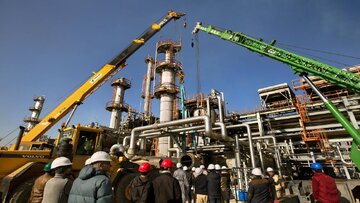AhlulBayt News Agency (ABNA): There's no exaggeration: Israel has expanded its military and intelligence facilities in the most geostrategic points in Yemen in the span of the war - however, not without the "grace" and aid of UAE and allies.
Washington’s imperial backdoor in West Asia, “Israel,” has a large stake in the war on Yemen and thus sneakily took part in it. However, feeding the monster required creating one:
“We have created a little Frankenstein,” Tamara Cofman Wittes, a former US State Department official told The New York Times, describing Abu Dhabi Crown Prince Mohammad Bin Zayed Al Nahyan (MBZ).
While dealing with Mohammad bin Salman (MBS) was very likely to be a headache for Washington, especially after the killing of Saudi journalist Jamal Khashoggi and the Saudi Crown Prince's stubborn oil ventures, Washington and “Tel Aviv” turned to MBZ, whose army has proven its military might, and, who shares common strategic interests with “Israel" in Yemen.
When it comes to "Israel" - a narcissistic colonial entity enslaved to its obsession with security and espionage - quite a number of matters can be addressed in how the entity benefits from the boundless war on Yemen, an international disaster that doesn't seem to have a way out.
We could roll out a map and draw a number of things: demarcation lines, military bases and intelligence facilities in Socotra, Nepalese and Colombian mercenaries trained by the Israeli occupation forces, even coalition attacks on Al-Hudaydah - or, we can bring out surveillance CCTVs and see how Israeli intelligence firms were paid to assassinate Yemeni leaders.
The most fitting description of how "Israel" has been maneuvering in this war would be "piggybacking," and this article explains how.
To remain impoverished
Much of "Israel's" security depends on the isolation of either Resistance factions, Resistance-supporting governments, or Palestine-supporting peoples throughout West Asia. This could perfectly be done through war and separation.
"'Israel' has always sought to undermine the formation of any Arab coalition that asserted the rights of Palestinians. Egypt neutralized itself under Sadat, which ended the Nasser era. Iraq was taken out by an invasion, and is now less willing to confront "Israel" because of the price paid. Syria most recently was bled without mercy. All these wars against the Arab world from 2003 onwards were primarily a product of Israeli lobbying within the US," Jay Tharappel told Al Mayadeen. Tharappel is a Sydney-based PhD candidate and a representative of the Yemen Solidarity Council and Hands off Syria Sydney.
He goes on to depict this picture against a Yemeni backdrop: "In the context of the Arab spring, the Yemeni revolution of 2014 deposed the puppet dictator Hadi, ending 34 years of Yemen being ruled by Presidents subservient to Saudi Arabia and the US."
The popular September 21 revolution, which collectively toppled the corrupt Yemeni government which had kept Yemen, as Tharappel calls it, "artificially poor," sent ripples of feat throughout US-aligned Arab regimes as well as "Israel," which rushed to contain any butterfly effect of a pro-Palestine revolt against corruption.
"When Yemen was subservient, it was kept artificially poor, and its elites simply plundered the country, and parked their money in Saudi Arabia. What Saudi Arabia wanted from Yemen during the Arab spring was federalization, so they could cut oil-pipeline deals with Hadhramaut province without any revenue going to northern Yemen where 70-80% of the population lives.
"As for 'Israel', they simply don't want the status quo in Yemen to flip. A poor Yemen ruled by corrupt dictators is infinitely preferable to 'Israel' to a revolutionary republic that could easily raise Yemeni living standards and capabilities to the level of Syria pre-2011."
Divide and conquer
Despite the billions of dollars put into this war, alongside the international aerial, maritime, and land support, analysts contend that the coalition’s strategy was a traditional divide and conquer strategy – UAE to the south and KSA to the north.
The divide in Yemen between north and south goes back to a colonial past; one can see an Anglo-Ottoman demarcation line dividing the country into 2 mega-provinces. The north, where pro-Ansar Allah forces are situated, is faced with groups of heterogenous armed groups, some are affiliated with al-Qaeda in the Arabian peninsula, other are separatist groups, Saudi-aligned UAE-funded groups in the south.
To crush the potential for a revolutionary state, the UAE has been working with "Israel" to turn the south into a client state, as political analyst Giorgio Cafiero puts it. Abu Dhabi aims to diversify its economic portfolio as MBZ looks to bring the UAE into a post-oil dependency era, while “Israel” seeks supremacy over strategic trade points in West Asia, not only gaining a Belt & Road leverage but also succeeding in isolating the Resistance.
Tharappel implies that the devastating war effect on Yemen would obstruct the revolution's efforts to cooperate with pro-Palestine regional powers, such as Iran, thus obstructing unity.
"Something like half the world's oil flows through the straight of Hormuz and Bab El-Mandeb. If Iran and Yemen were to become strong allies, and if they were allowed room to grow and breathe, they would build a powerful navy, and Yemen would build a powerful army." He added that "such an army could quite easily take chunks out of Saudi territory that was historically Yemeni, like Baha, Asir, Jizan, and Najran."
As an antidote to unity, "Israel" has been supporting Abu Dhabi in its proxy war in the south, the Southern Transitional Council (STC), which are pro-"Israel" separatist forces whose primary goal is to grant 'South Yemen' its own autonomy.
“'Israel’s' secret friend” in Aden, Bab El-Mandeb, & Socotra
Through small separatist movements in Southern Yemen came the STC – the Southern Transitional Council, which is politically, materially and military-backed by the UAE, founded in 2017 at the peak of the war on Yemen.
The editor-in-chief of Israel Today, Aviel Schneider, described in 2020 the STC as “ 'Israel’s' new secret friend,” citing secret meetings between Israeli officers and the council without revealing any detail.
Upon the normalization agreement between the UAE and “Israel,” STC deputy chief Hani Bin Braik expressed positivity towards the agreement, revealing in the process that the STC is willing to cooperate with any entity that supports the secession of south Yemen – even if that meant dealing with “Israel.”
Aden, the former British administrative capital in Yemen
According to Schneider, the region is "witnessing the birth of a new Arab state in Aden, Southern Yemen, the former British colony in Yemen, in the Middle East," and that “many Israelis responded positively to these sentiments, and sent greetings to the new autonomous state in Yemen. Various sources in Jerusalem (Occupied Al-Quds) told Israel Today that Israel is conducting secret meetings with the new government in southern Yemen.”
The Port of Aden is home to the largest container terminal in Yemen, and is extremely strategic in its location as it is situated near one of the busiest shipping lanes in the world.
Furthermore, Aden is seen to be a significant part of the Maritime Silk Road, which only increases its economic value.
The province is now under the control of the UAE.
STC takes Bab El-Mandeb
Side by side with Abu Dhabi, "Israel" seeks a stronghold over the Red Sea - that could not be done without grabbing a hold of the Bab El-Mandeb strait, which is now under UAE.
Almost 9% of the world’s oil imports pass through Bab El-Mandeb, which is bound to be an important part of China's new Belt and Road initiative.
A report by Carnegie Endowment contends that the strait is as important to Egypt as it's important to "Israel", especially if the Israeli Ben Gurion canal - which aims to connect the Red Sea to the Mediterranean - is constructed.
Bab El-Mandeb connects the Indian Ocean and the Mediterranean Sea, through the Red Sea and the Suez Canal, both of which Israel looks to maintain territorial supremacy over, despite that "Israel" seeks to create competition with its new canal against the Suez.
Every year, 20,000 ships pass through the strait.
Socotra: Israeli, and Emirati joint-colonial enterprise
In June 2020, the STC took control of Socotra, an island off the coast of Yemen, which already adds to the UAE's already-annexed 78 marine terminals in over 40 countries. Although the UAE claimed that it does not wish for a long-term presence on the geologically and strategically unique island of Socotra, what has been happening on the ground narrates a contrasting story.
The UAE has used the STC to hijack the island, force out the local governor, shove governmental forces aside and take control of the capital, Hadibo, where "Israel" and the UAE have been collaborating on building intelligence centers.
"'Israel' and the UAE have seized control of Socotra island which is internationally recognized as Yemeni territory. 'Israel' is turning it into an intelligence base. Because of this strategic depth that 'Israel' has gained, they were able to attack the Saviz, an Iranian ship, back in April 2021," explained Tharappel.
Earlier this year, an investigation revealed that a new military base has been established on Socotra, in the island of Abd Al-Kuri, containing an aircraft runway. Though under construction, the runway is 30 meters wide and 540 meters long, and comes alongside the establishment of an Israeli military surveillance center on the island.
Socotra overlooks the Gulf of Aden, the Arabian Sea, and the Gulf of Oman, and faces the Horn of Africa from the west.
Military training in "Israel", an attack on Al-Hudaydah in the north
According to an Al-Khaleej Online report in 2018, sources close to the US House Permanent Select Committee on Intelligence revealed that hundreds of Emirati-funded Western mercenaries, after receiving intensive combat training in “Israel,” launched an attack on Al-Hudaydah.
The mercenaries were of various nationalities, and the goal was to “reclaim Al-Hudaydah from Ansar Allah’s grasp, who have shown fierce resistance," according to the report. The Saudi-Emirati coalition, however, did not reach its goals in the attack, but rather killed and injured civilians with coalition airstrikes.
The secret training camps, which held hundreds of Nepalese and Colombian mercenaries, were situated in the Naqab desert in occupied Palestine, where the geological nature of the region looks synonymous with that of Yemen.
Mohammed Dahlan, a former leader of Palestinian Fatah, who is now the security advisor to the Abu Dhabi Crown Prince Mohammad bin Zayed, personally supervised the training and made regular visits and check-ups.
"Mohammed Dahlan visited these camps on more than one occasion to be informed," the sources revealed to Al-Khaleej Online. Dahlan was filled in on the progress of the preparations, in addition to the mercenaries’ training.
Within this context, analysts argue that there is an Israeli project, led by the UAE, to apply itself to aid in Abu Dhabi’s control of the city and its port. If successful, “Tel Aviv” would impose its guardianship of the Red Sea, through which "Eilat" will become an increasingly active economic and trade hub.
"'Israel' provided the Saudi Air Force with internationally prohibited bombs and missiles, which it used in bombing the Yemeni governorates under the control of the Houthi group, with the aim of testing it and determining its destructive capacity and the extent of its impact on humans,” the sources revealed, exposing in the process Saudi Arabia for claiming that the weapons are US-made in fear of Arab outrage.
Intelligence and assassination
An intelligence firm run by an Israeli businessman, Abraham Golan, was recruited to carry out a series of assassination operations in Yemen.
Mohammed Dahlan, in cooperation with private military company Spear Operation Group, paid Golan to employ American mercenaries, which include former members of elite units in the US military, to carry out assassinations in Yemen.
According to sources, Golan “maintains long-standing connections in 'Israel' for his security business,” has lived in “Israel” for many years, and was in contact with former Mossad chief Danny Yatom.
Golan contended that he killed “terrorists” who were identified by the UAE government. One of the botched assassination attempts was the targeting of Anssaf Ali Mayo, a Yemeni leader for the Islah political party.
Commenting on the matter at hand, a CIA official said the mercenaries were “almost like a murder squad.”
In September 2021, a Yemeni news outlet YP Agency reported that “Israel” established an intelligence center at Socotra airport, southern Yemen, according to local sources.
The UAE’s Red Crescent Society signed a contract with “Israel” to establish an intelligence enter for the Israeli Air Force in the airport of the island’s capital, Hadibo, according to the sources.
Months before, Abu Dhabi sent ships to Socotra, carrying Israeli military equipment and devices.
Another proof is the use of the Israeli Pegasus spyware to hack into the phone of UN-appointed investigator, Kamel Jendoubi, who was assigned to look into war crimes against Yemen.
The spyware which traces back to the Israeli NSO Group, that made international headlines, was found in Jendoubi’s phone by Amnesty International IT experts.
The journalist’s phone, the results suggested, was hacked 3 weeks before his investigation’s results, which exposed Saudi-UAE war crimes, were revealed.
Implications
Faces may change but mentalities remain. Looking into Yemen's recent history, geography has not forgotten the British demarcation lines between the north and south - lines which maintain their impact till this day.
With the material, political and military support of the UAE, those lines have come alive in the collective psyche of separatists and extremists, and have catered to a reality lethal for millions in Yemen.
Abu Dhabi may enjoy their bounties for now. However, anyone with slightest knowledge on Palestinian history would know that colonizers like "Israel" know no limits to their entitlement - if any.
/129





